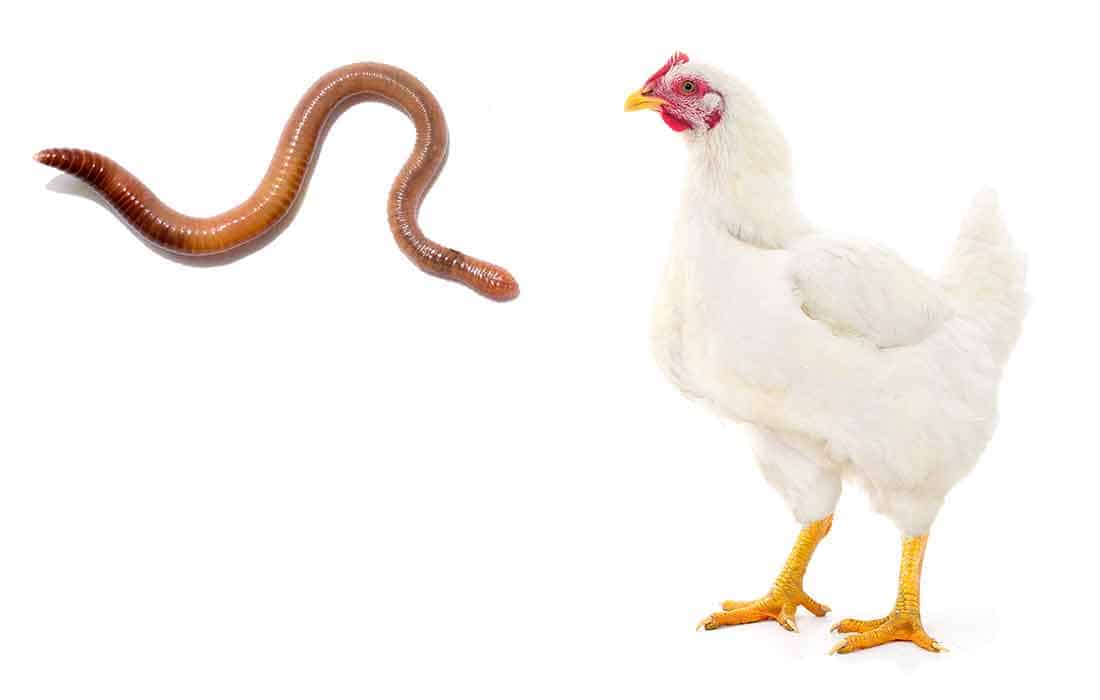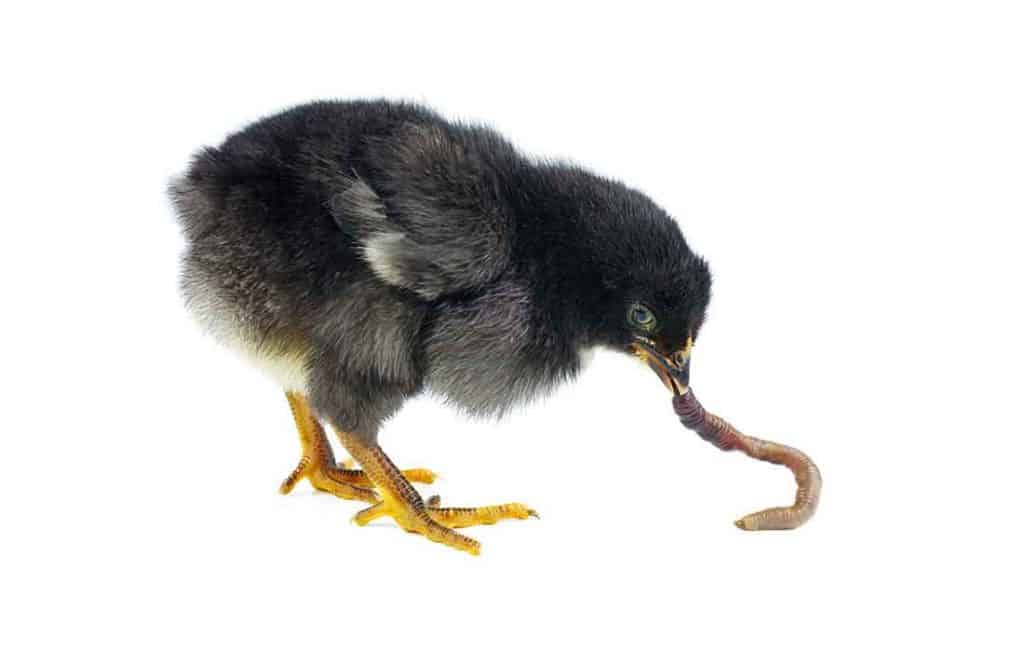If you have chickens that roam free, you’ve likely noticed your flock pecking at the dirt eating spiders, worms, grubs, maggots, centipedes, slugs, etc. When you see this, you may wonder to yourself: Can chickens eat earthworms?
Can Chickens Eat Earthworms?
Yes! Chickens can eat earthworms. Worms are a hearty and healthy snack for chickens, containing over 20 trace minerals, including calcium, iron, manganese, and zinc. Both earthworms and mealworms can be a great tasty snack that can be provided as fresh or dried treats.
Let’s take a look at what you need to know about feeding worms to your chickens, the nutrients found in them, the dangers, and much more.

*This page contains affiliate links to products I recommend. If you purchase something from this page, I may receive a small percentage of the sale at no extra cost to you.
But first, here’s a video of chickens and chicks eating worms and maggots in compost, and the best part is they love it!
Earthworms as Food
Earthworms are an excellent choice for fishing bait and duck feed, but what about for human consumption?
In China, people have been eating earthworms for centuries. Even now, locals in China and Taiwan prepare unique dishes with the earthworm as the main ingredient.
For example, earthworm soup, a traditional delicacy, is still offered in some restaurants in the Guangdong province in China.
Recently countries in Western Europe have begun to produce edible earthworm products like canned earthworms and earthworm biscuits.
Within the last 30 years, earthworm culture has begun to replace fish meal and soybean meal as animal feed on a commercial scale due to the earthworm containing elevated levels of protein and other nutritional compounds.
Do Chickens Like Earthworms?
Like their human counterparts, not all chickens have the same taste in food. However, in general, chickens love earthworms and other insects. They also love eating human foods like cabbage heads, yogurt, etc.
Chickens, like other animals, are perceptive when it comes to their feed and nutrition.
If you are liberally feeding your chickens with the commercial feed, they may be less receptive to worms and other bugs and insects.
To increase your chickens’ consumption of worms, reduce their feed, or increase their activity to increase their hunger levels.
Some hatchery-reared chickens are raised in commercial brooders and finished in sheds before being sold.
These chickens often did not have a mother hen to show them what to eat or how to scratch in the ground to find insects.
Chickens that have only ever eaten chicken feed, pellets, or human food may not know how to eat worms. It will take them time to learn how to act like a chicken and forage for bugs.
Are There Any Benefits to Feeding Earthworms to Chickens?
Earthworms are a wriggling superfood for your flock. They are a great source of protein and amino acids for your chickens.
Proteins and amino acids are essential to the health of egg-laying animals, including chickens.
They also contain copper, zinc, manganese, and as much calcium as fresh cheese or cow’s milk. (source)
How Many Earthworms Can My Chicken Eat?
While there is no known limit to how many worms a chicken can consume throughout a day, the truth is they will likely never be able to over-consume them.
So, this is not something that you will need to regulate.
It would take 50-150 worms per chicken per day to fulfill the chicken’s protein requirements on a worm-only diet.
However, a worm-only diet is not recommended as chickens do have nutritional requirements beyond earthworms can provide. Chickens need a complete and balanced diet to ensure a happy and healthy life.
A free-range chicken will do well on up to 10 worms in a day in addition to the chicken’s regular diet.
It is important to note that if you provide too many worms, the uneaten worms may die and start to decompose, leading to ants, flies, and other vermin.
Be sure to keep your chickens’ environment clean at all times to prevent this from occurring.
Where Do Chickens Get Earthworms?
Earthworms are abundant in rich and healthy soils and will rise to the soil’s surface, especially in wet weather.
Chickens can find earthworms on their own if they roam free; you can also provide dried or live worms to your chickens.
There are three ways to find earthworms in nature:
- Going out at night in damp weather to collect them from the surface of the ground.
- Making a compost heap and collecting them from the compost heap.
- Digging into the ground to find them in the dirt. This can be done when it is wet or dry out.
Earthworms can be kept and stored alive and bred easily and indefinitely using only a container to hold your compost, food scraps, and some bedding.
Shredded newspaper, composted manure, and fallen leaves make excellent bedding, but you can use any organic, compostable material.
Generally, it is better to avoid using highly acidic material (pine needles, oak leaves).
Earthworm Nutritional Information
Earthworms contain essential amino acids, calcium, and other nutrients that are critical to humans’ health; no wonder they have become a delicatessen in some countries. They are comparable to other protein sources that are used in poultry foods, especially fish.
The Royal Society performed an in-depth study on the nutrient content of earthworms.
They found that the Yekuana indigenous people who consumed earthworms were able to satisfy a significant fraction of their amino acids’ daily requirements, especially calcium and iron.
You can’t go wrong to let your chickens eat earthworms they dig up from the yard.
Nutrent Content of Earthworms (Lumbicus terristris)
| Nutrients | Quantity |
| Selenium | 0.40 mg/kg |
| Lysine | 0.66% |
| Threonine | 0.47% |
| Moisture | 83.6% |
| Metabolizable Energy | 708 Kcal/kg |
| Chloride | 910 mg/kg |
| Arginine | 0.61% |
| Crude Protein | 10.5% |
| Methionine | 0.19% |
| Ash | 0.6% |
| Iodine | 0.38 mg/kg |
| Phosphorus | 1820 mg/kg |
| Fat | 1.6% |
| Calcium | 444 mg/kg |
Finally, chickens need a small amount of course material like dirt in their diet to help them digest their food, and earthworms can be a good source of this course material.
How to Feed Chickens Earthworms?
You can feed your chickens the red worms and earthworms you find under bricks or in your garden. Most chickens will find their own when they’re out free-ranging.
Raising Earthworms for Your Chickens
Consider creating a compost pile, which will eventually make a fresh supply of worms for your chickens. Raising your worms cuts down on your feed costs and reduces kitchen waste.
You can not only feed your chickens the compost, but it is also great for healthy plant growth.
Can Chicks Eat Earthworms?

Chicks love eating worms from day one and will gladly eat any they find in your garden. However, you should avoid letting your chicks eat worms until they become an adult.
Worms carry a parasite that can give them intestinal worms. It’s best to let your chicken become an adult before allowing them to forage for worms on their own or until you have them on a worming schedule.
Frequently Asked Questions
Are there any safety concerns when feeding my chicken earthworms?
Depending on metals’ concentration in their environment, earthworms can contain elevated levels of some heavy metals that can be harmful to animals and human beings.
It is best to feed your chickens fresh live worms and stay away from worms you find that look to be dead to dying, as those worms are more likely to contain parasites or dangerous pathogens.
Gapeworms
The most significant risk to your chickens is the parasite Gapeworm.
Gapeworms live in the ground and stay dormant until a host, like an earthworm, comes by. The gapeworm will attach and burrow into the earthworm and will live there.
If your chicken eats an earthworm infected with a gapeworm, the gapeworm can stay inside the trachea or lungs of your chicken.
If this happens, your chicken will show symptoms, including:
- Gasping
- Head shaking
- Loss of appetite
- Gurgling
- Coughing and choking
Without treatment, the bird can suffocate and die. Gapeworms are rare but are something every chicken owner should know about.
Some disadvantages of using worms for chicken feed?
- Earthworms are predominant at night, whereas chickens are daytime feeders.
- It takes time to produce your own. You have to collect, breed, and give them time to grow.
- Production beyond a certain level takes money and equipment. Making worms a primary source of feed requires a considerable setup, even for just a few chickens.
- Earthworm production is seasonal and can be problematic in the winter as cold weather sends earthworms deep into the ground to hibernate.
Final Word
Chickens are omnivores and will eat earthworms, bugs, mice, and pretty much anything they can find. If you’re worried about them getting gapeworm, don’t feed them worms. Just let them eat what they find in the dirt.
Parasites like gapeworm are a risk, but most chickens will never eat enough worms to experience it. You can always monitor your flock to ensure they don’t overeat.
Worms are abundant in nutrients and minerals that will benefit your flock. If your chickens don’t have access to worms, consider feeding them these earthworms you can buy online.